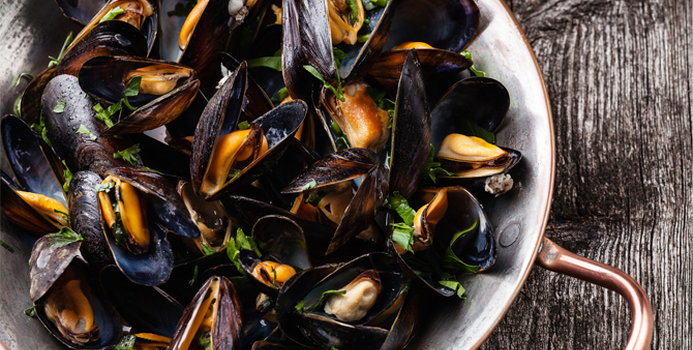Mussels are mollusks found in fresh water and salt water habitats. They are longer and more elongated that other types of edible mollusks like clams. They are frequently found attached and clumped together on wave-washed rocks. To reach market size it takes mussels over a year to grow. After harvesting, they are rinsed in salt water tanks to remove impurities. When buying mussels, you want make sure that they are alive prior to cooking. Shells should be tightly closed and responsive to tapping if slightly opened.
Nutritional Value of Mussels
3 oz raw Mussels (85grams)
Calories: 72
Fat: 3g / 3% DV
Carbohydrates: 3g/ 1% DV
Protein: 9g / 21% DV
Vitamin B12: 10mcg / 170% DV
Manganese: 3mg / 144% DV
Vitamin C: 6.8mg / 11% DV
Iron: 3.4mg / 19% DV
Health Benefits of Mussels
- Mussels contain lots of vitamin B12. In a single serving, you get more than your Daily Value! B12 is important to your body because it is needed to make red blood cells, and is a vital part of many body chemicals found in every cell.
- Manganese is also found in large amounts in mussels. This mineral is used by your body as part of enzymatic functions, bone formation and metabolizing energy from food.
- Mussels are also a good source of iron and of vitamin c, which helps your body better absorb the iron. Iron is an essential part of hemoglobin, and helps support healthy immune function.
- Mussels are considered a high quality/complete protein, scoring 106 on the Amino Acid protein quality scale.
Dangers of Mussels
Some times of the year, fresh mussels must be avoided from certain coastlines. On the west coast of the U.S. during warm months, there is a danger of toxic planktonic organisms, or poisoning related to red tides. The red tides, caused by dinoflagellates, are harmless to mussels but toxic to humans. Consuming exposed mussels can result in serious illness, like paralytic poisoning.
Recipe Ideas for Mussels
- Mussels can be smoked, roasted, boiled, steamed, barbecued or fried in butter or vegetable oils and added to almost any recipe for the protein source.
- Try adding to traditional Thai curries for a protein and flavor boost.
- Add to a variety of pasta dishes. Mussels go well with white sauces, red sauces and in fresh vegetable pasta primavera.
- Like fritters? Try breading mussels with dry falafel mix for a protein packed snack.
- Cook in coconut milk with lots of garlic and hot peppers for a spicy taste.

Emily DeLacey MS, RD is a Registered Dietitian and currently working in Jamaica as a HIV/ AIDS Prevention Specialist. She attended Central Washington University for her Bachelor's Degree in Science and Dietetics and continued on after her internship to Kent State University for her Master's Degree in Science and Nutrition, with a focus on public health and advocacy. She served as a U.S. Peace Corps Volunteer in Malawi 2012-2014 working as a Community Health Advisor in a rural village, immersing in the joys of life without electricity or running water. She has been to 20+ countries and 47 of the 50 states in the US. Traveling, adventuring and experiencing new cultures has made her a passionate advocate for the equality of nutrition and wellness for all people.



